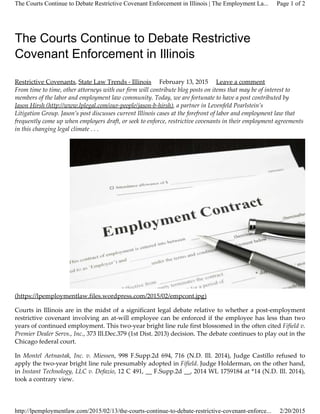
The Courts Continue to Debate Restrictive Covenant Enforcement in Illinois (UPDATE)
- 1. The Courts Continue to Debate Restrictive Covenant Enforcement in Illinois Restrictive Covenants, State Law Trends Illinois February 13, 2015 Leave a comment From time to time, other attorneys with our firm will contribute blog posts on items that may be of interest to members of the labor and employment law community. Today, we are fortunate to have a post contributed by Jason Hirsh (http://www.lplegal.com/ourpeople/jasonbhirsh), a partner in Levenfeld Pearlstein’s Litigation Group. Jason’s post discusses current Illinois cases at the forefront of labor and employment law that frequently come up when employers draft, or seek to enforce, restrictive covenants in their employment agreements in this changing legal climate . . . (https://lpemploymentlaw.files.wordpress.com/2015/02/empcont.jpg) Courts in Illinois are in the midst of a significant legal debate relative to whether a postemployment restrictive covenant involving an atwill employee can be enforced if the employee has less than two years of continued employment. This twoyear bright line rule first blossomed in the often cited Fifield v. Premier Dealer Servs., Inc., 373 Ill.Dec.379 (1st Dist. 2013) decision. The debate continues to play out in the Chicago federal court. In Montel Aetnastak, Inc. v. Miessen, 998 F.Supp.2d 694, 716 (N.D. Ill. 2014), Judge Castillo refused to apply the twoyear bright line rule presumably adopted in Fifield. Judge Holderman, on the other hand, in Instant Technology, LLC v. Defazio, 12 C 491, __ F.Supp.2d __, 2014 WL 1759184 at *14 (N.D. Ill. 2014), took a contrary view. Page 1 of 2The Courts Continue to Debate Restrictive Covenant Enforcement in Illinois | The Employment La... 2/20/2015http://lpemploymentlaw.com/2015/02/13/the-courts-continue-to-debate-restrictive-covenant-enforce...
- 2. On February 6, 2015, in Bankers Life and Casualty Company v. Richard Miller, et al., Case No. 14 CV 3165, Judge Shah waded into this controversy and rejected the twoyear bright line rule. Instead, Judge Shah concluded that not only has “the Illinois Supreme Court not spoken on this issue”, but that case law does not support the argument that two years of employment is “necessary” to support a restrictive covenant. This is a critically important issue affecting employers. Given the obvious uncertainty in the area of restrictive covenant enforcement, we recommend other forms of consideration, such as bonus payments, be considered. Read the Bankers Life and Casualty Company v. Richard Miller, et al., Case No. 14 CV 3165 decision. (https://lpemploymentlaw.files.wordpress.com/2015/02/bankerslifeandcasualtycovmiller.pdf) UPDATE (2/20/15) On the heels of Bankers Life, on February 13, 2015, in Cumulus Radio Corp. v. Olson, et al., Case No. 15cv 1067 (C.D. Ill.2015) (https://lpemploymentlaw.files.wordpress.com/2015/02/cumulusvolson.pdf), Judge McDade of the federal court in Peoria, Illinois granted an employer’s motion for a temporary restraining order stating “the Court does not believe that the Illinois Supreme Court would adopt the brightline test announced in Fifield.” Judge McDade added that the twoyear bright line rule “suffers from a number of analytical problems that make it unsatisfying.” Judge McDade also stated it also suffers from a “failure to give weight to the reason that an employee’s atwill employment ended.” Favoring a case bycase analysis, akin to that suggested by Bankers Life, Judge McDade further criticized the twoyear bright line rule stating “[s]uch a rule is overprotective of employees, and risks making postemployment restrictive covenants illusory for employers subject completely to the whimsy of the employee as to the length of his employment.” Tagged: Illinois labor and employment law decisions (http://lpemploymentlaw.com/tag/illinoislabor andemploymentlawdecisions/), Restrictive Covenants (http://lpemploymentlaw.com/tag/restrictive covenants/) Blog at WordPress.com. | The Delicacy Theme. Follow Follow “The Employment Lawyers” Build a website with WordPress.com Page 2 of 2The Courts Continue to Debate Restrictive Covenant Enforcement in Illinois | The Employment La... 2/20/2015http://lpemploymentlaw.com/2015/02/13/the-courts-continue-to-debate-restrictive-covenant-enforce...